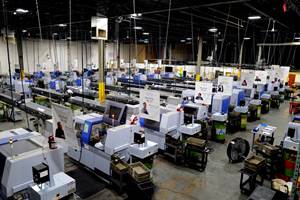Don't Miss This: Technology Trends
Manufacturing advances like automation and machine monitoring software are not only affordable for job shops, they may soon become competitive necessities.
Share






Cobots in Wagner Machine’s milling department have enabled the high-mix manufacturer to extend production past the end of its manned shift and match the profitability of its turning department.
Photo Credit: Wagner Machine
Advanced manufacturing technology is no longer limited to large companies. Continuing innovations in automation, shopfloor software and more have made borne fruit with products and options well-suited and affordable for independent manufacturers. This maturation doesn’t just make these technologies accessible for job shops, however: it has started to make these technologies a necessity to compete in the modern manufacturing marketplace.
High-Mix Automation
Automation has long been out of reach for job shops for two reasons: cost and a reliance on low-mix production. Technology maturation has led to lower prices on cobots, pallet changers and other automation technologies, but high part mixes have continued to stymie lights-out automation efforts.
of Champaign, Illinois, bypasses this limitation by acknowledging that high-mix automation doesn’t need to mean full 24/7 automation. “If you’re trying to get 24/7 production, that takes a lot more planning than just trying to bump your production by 50%,” says Kurt Wagner, owner of Wagner Machine. Wagner has used cobots to automate machine tending on five-axis machines for jobs requiring at least 50 hours of total machine time. As a single-shift shop, even four hours of nightly automation is a 50% productivity boost, so time spent on programming is offset quickly enough to make automation cost-effective. By the time three of Wagner’s five planned custom cobot cells were online, robotic automation had boosted the production milling team’s productivity by more than 30% while improving on-time deliveries.
is another high-mix shop that uses automation to manage its workload. While the shop does use its palletized five-axis turn-mill for lights-out automation, the machine’s pallet changer has been just as useful for prototyping during the day. With six pallets, the shop can prepare for multiple future jobs even as the machine works on one. “It keeps us productive when we would otherwise have to stop the machine,” says Todd Peterson, co-owner of Peterson Machining.
Shopfloor Software
High-end ERP and machine monitoring software have also driven significant productivity improvements at job shops. For , adopting ProShop ERP improved setup documentation and management of job travelers. “It’s led to reduced overall setup times, higher spindle uptime and less scrap,” says Chris Guidotti, son of East Branch’s founder. Revenue increased by 18% within a year, with process improvements helping the shop eliminate $20,000 in expediting fees and $12,000 in shipping fees.
Machine monitoring has made a similarly large impact at . While the shop’s machinists were originally apprehensive about switching from paper shopfloor efficiency tracking to MachineMetrics, positioning the new machine monitoring strategy as process-based rather than people-based improved shopfloor acceptance. The ability to quantitatively track machine uptime helped AccuRounds determine where additional training or tooling adjustments were most needed. The shop’s resulting improvement efforts led to a 20% increase in OEE and a 15% reduction in tooling spend.
Cybersecurity
Cybersecurity options are now more available to job shops than ever — and more necessary. Hacking attempts on job shops are not matters of if, but when, says Allison Giddens, president of . The cost of developing a cybersecurity plan now is far less than the cost of recovering lost data (and lost customer trust) after a malicious cyberattack.
Job shops aiming to work in the defense industry should also know that Cybersecurity Maturity Model Certification (¸ßĹâÂĘÁůşĎ˛ĘC) audits will soon be a prerequisite for sensitive work. These audits will require shops to not only invest in cybersecurity technology and training, but prove their proficiency with it.
Learn more about cybersecurity options in the Emerging Technology Center.
Related Content
Lean Approach to Automated Machine Tending Delivers Quicker Paths to Success
Almost any shop can automate at least some of its production, even in low-volume, high-mix applications. The key to getting started is finding the simplest solutions that fit your requirements. It helps to work with an automation partner that understands your needs.
Read MoreSetting Up the Building Blocks for a Digital Factory
Woodward Inc. spent over a year developing an API to connect machines to its digital factory. Caron Engineering’s MiConnect has cut most of this process while also granting the shop greater access to machine information.
Read MoreInside the Premium Machine Shop Making Fasteners
AMPG can’t help but take risks — its management doesn’t know how to run machines. But these risks have enabled it to become a runaway success in its market.
Read MoreEmbracing Automation: Strategies for Small to Medium-Sized Machine Shops
Business drivers for automating to help navigate workforce challenges and boost profitability.
Read MoreRead Next
Machine Shop MBA
Making Chips and ¸ßĹâÂĘÁůşĎ˛Ę are teaming up for a new podcast series called Machine Shop MBA—designed to help manufacturers measure their success against the industry’s best. Through the lens of the Top Shops benchmarking program, the series explores the KPIs that set high-performing shops apart, from machine utilization and first-pass yield to employee engagement and revenue per employee.
Read MoreAMRs Are Moving Into Manufacturing: 4 Considerations for Implementation
AMRs can provide a flexible, easy-to-use automation platform so long as manufacturers choose a suitable task and prepare their facilities.
Read More





















